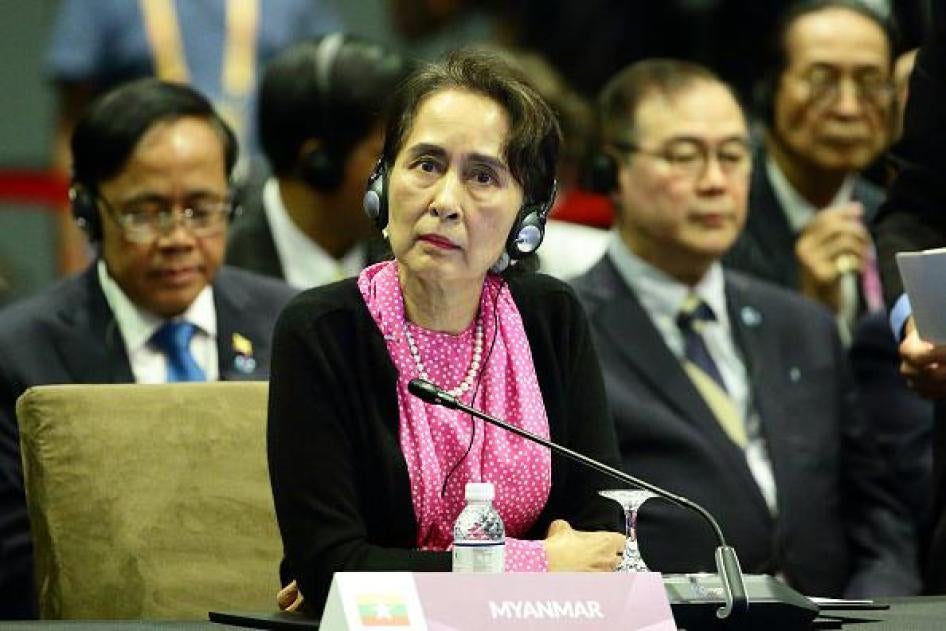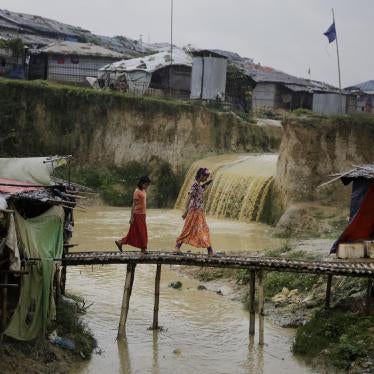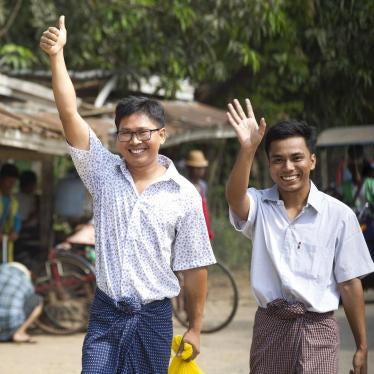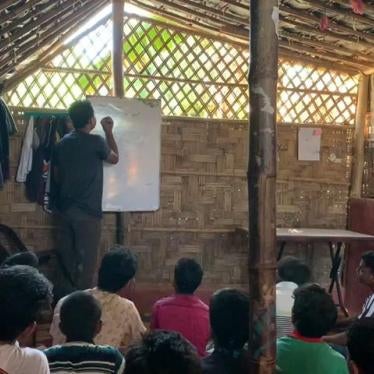(New York) – Southeast Asian leaders at their annual summit should drastically rethink their response to the plight of Myanmar’s ethnic Rohingya, Human Rights Watch said today. The 10 leaders of the Association of Southeast Asian Nations (ASEAN) are scheduled to meet at the 34th ASEAN Summit in Bangkok, Thailand from June 20-23, 2019.
During its 2018 summit, ASEAN addressed the Rohingya crisis but focused largely on repatriation issues, treating the “humanitarian situation” in Myanmar’s Rakhine State merely as “a matter of concern” and disregarding the government’s crimes against humanity. For this week’s summit, ASEAN’s Emergency Response and Action Team (ERAT) produced a “preliminary needs assessment” on repatriation for the approximately one million Rohingya refugees now in Bangladesh. The 56-page report, obtained by Human Rights Watch, was developed without input from Rohingya refugees and almost entirely disregards the Myanmar government’s atrocities that led to mass displacement. It does not even use the term “Rohingya,” denying the group’s self-identity.
“ASEAN seems intent on discussing the future of the Rohingya without condemning – or even acknowledging – the Myanmar military’s ethnic cleansing campaign against them,” said Brad Adams, Asia director. “It’s preposterous for ASEAN leaders to be discussing the repatriation of a traumatized population into the hands of the security forces who killed, raped, and robbed them.”
Myanmar’s government has repeatedly denied that its military was primarily responsible for the current refugee situation, ludicrously blaming Rohingya for the widespread destruction and displacement. In its closing statement at the 2018 summit, ASEAN expressed “[t]he need to find a comprehensive and durable solution to address the root causes of the conflict and to create a conducive environment so that the affected communities can rebuild their lives.”
Yet ASEAN’s ensuing focus on a repatriation process – as shown in the ERAT report – ignores the situation on the ground, sets unrealistic markers for assessing Myanmar’s progress, and fails to identify the root causes of the crisis that need to be resolved before refugees can return in safety and dignity. ASEAN has also ignored efforts to investigate abuses and obtain justice for victims of atrocities.
The ERAT report said it aims “to assess the readiness of Reception and Transit Centres, including potential relocation sites that have been identified by the Government of Myanmar,” but noted that whether or not conditions were in place for return was “beyond the scope” of the assessment. The ASEAN Coordinating Centre for Humanitarian Assistance (AHA Centre) responded to criticism of this omission by claiming that ERAT’s area of expertise and mandate was “disaster management…. It’s very focused and we cannot go beyond our mandate.”
The report also does not address the challenges resulting from the fighting between the military and Arakan Army that has displaced over 35,000 ethnic Rakhine and others since January.
ASEAN’s drafting of a repatriation assessment without addressing fundamental rights concerns shows disturbing disregard for the well-being of the affected population.
The United Nations, Human Rights Watch, and numerous other humanitarian and human rights groups have concluded that current conditions in Rakhine State are not conducive for voluntary, safe, or dignified repatriation of Rohingya. The estimated 500,000 Rohingya remaining in Myanmar are trapped in appalling conditions, confined to camps and villages without freedom of movement, subject to ongoing state persecution and violence, and cut off from many basic humanitarian services including adequate food, medical care, and education. Neither the national nor the Rakhine State government has moved to improve conditions or address the causes underlying the crisis. Returning Rohingya to Myanmar would condemn them to lives of deprivation, oppression, and possibly death.
Most of the several hundred Rohingya refugees interviewed by Human Rights Watch said they want to go home eventually, but only if the government ensured their security, access to land and livelihoods, freedom of movement, and citizenship rights.
“How can we go back? They will kill us if we go back,” a Rohingya refugee told Human Rights Watch. “They say we are foreign settlers. My grandfather had a citizenship card. My mother. My father. My older brother. But they say I am not a citizen. This is forced. This is involuntary.”
The “reception and transit centers” that the AHA Centre visited for its assessment, constructed to process and house returnees, are surrounded by barbed-wire perimeter fences and security outposts, similar to the central Rakhine detention camps where more than 124,000 Rohingya have been confined for almost seven years. In fact, the Hla Poe Kaung reception center was built on land where Rohingya had been living before Myanmar security forces forced them to flee and burned down their villages, and the government subsequently bulldozed the ruins and redeveloped the area.
The ERAT report outlines a ramped-up security presence in Rakhine State that raises grave rights concerns. The report mentions “[s]trict security measures … at the Transit and Reception Centres and their respective surroundings.… Armed BGP [Border Guard Police] deployed at guard posts along main roadways, intersections and at key locations such as schools, places of worship, markets and entrances to villages” claiming deployments are based on “ongoing security considerations, e.g. occurrences of militant/terrorist attacks.”
These questionable security measures mistakenly lauded as a reflection of the Myanmar government’s “priority in maintaining peace and security in that area.” The report continues:
Security measures set in place may potentially cause inconvenience to the returnees e.g. multiple levels of recording personal details and verifications, with curfews and recording of movement set in place. However, it is important to note that such measures are ultimately established for the safety and long-term benefit of all e.g. both returnees and existing populations. Although there are short-term inconveniences e.g. temporary movement restriction, the community still hopes to strive for long-term stability and peace in Rakhine State.
The Myanmar government has long invoked “security concerns” as a rationale for violating the rights of Rohingya to travel outside of their camps and villages in Rakhine State. By echoing the government’s claim that Rohingya are confined for their own protection, and by not using the term “Rohingya” at all, the ERAT report adopts the government’s political narrative.
“Instead of adopting Myanmar propaganda, ASEAN should be pressing Myanmar to start cooperating with international institutions or else face consequences,” Adams said.
UN officials, humanitarian actors, and human rights groups have repeatedly called on Myanmar to allow observers and humanitarian actors into Rakhine State and cooperate with UN inquiries set up by the UN Human Rights Council.
ASEAN could play an important facilitating role for genuine reforms and communicating to Myanmar that if it ignores concerns it may face intensifying economic sanctions and travel bans on senior military commanders, as well as removal of Myanmar from important regional and international military and economic initiatives.
The ERAT assessment team did not visit the camps in Bangladesh or consult Rohingya refugees. The report does “not speak on behalf of the Rohingya refugees,” according to the Arakan Rohingya Society for Peace and Human Rights, a Rohingya advocacy group. “Rohingya refugees can speak for ourselves. There will be no repatriation without talking to us.”
Myanmar and Bangladesh should meaningfully consult with Rohingya communities on both sides of the border, and fully involve Rohingya representatives in the design and implementation of any repatriation process to ensure that it is safe and voluntary. ASEAN should be clear that no repatriation takes place until Rohingya refugees can make free and informed decisions about return, with the full involvement of the UN High Commissioner for Refugees.
“Malaysia and Indonesia have led past efforts to raise Rohingya issues during regional meetings, and it’s vital they do so again at this week’s ASEAN summit,” Adams said. “ASEAN’s credibility to deal with a damaging regional crisis is on the line.”









